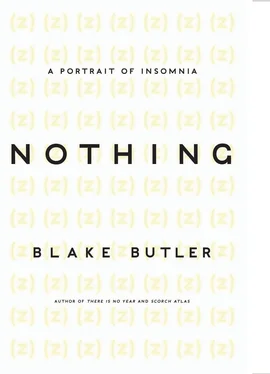The revolt, though, rather than against some figurehead of history or politics, must be here against the self — to dismantle not the product of the place and aim of being, but the site of it: the body and the home, eater and container of all air. These people, in Marcus’s programmatic language, read less like actual humans (narrative characters) and more like relics, photographs of selves of us in rooms we already do not remember — though the blood of such want and supplication are all over our (the reader’s) hands: we in the many shifting nightly versions of ourselves inside of sleep each day, upon waking, seem in the same way so far apart, like we’d been acting, or summoned into a game — this gevortsing is all the actions we’ve been taking without taking, wearing ourselves down in every instance by the doing and not doing, no matter to what extent we feel we have or have not failed — our eternal want for the thing we cannot have, to be the place we cannot be, to stay alive though we will die, to live in one house with all our love forever and to be alone, to sing in silence, to be free the way we feel when we’re asleep.
One could list these shapes of spaces on and on forever — these rooms which operate in texture like some vacated space located only forever there inside the film, though seeming connectable to your own light, as if through a tunnel hidden behind a certain panel of your home. Proust well reflects this weirding schism between the hidden self and the framing bodies in his Swann’s Way : “But even though I knew I was not in any of the houses of which in my ignorance upon waking had instantly, if not presented me with the distinct picture, at least made me believe the presence possible, my memory had been stirred; generally I would not try to go back to sleep right away; I would spend the greater part of the night remembering our life. ..” Our life, yes: sleep does contain a life. Our memory serves as a series of mirrors, as would a home’s hold, the walls of the houses in flux therein around them — the one stable section those returning surfaces that spit the self back at the self — the self thereby split somewhere in there at some centerless center, again refracted. The night’s soft settle in our eaves, bursting in its reflection, and yet clung to in the blank. Each contains an affect that stays upon you, in the body, however traced or disregarded — and in the space made there resides, continues to exist both part and parcel, however morphed by memory and time. Inside each home, its rooms. Inside each room, the objects. Inside the objects, open doors, leading silent into something uninvited, often ever never named, at once always under infiltration, and somehow daily known as home, a thing we mark by simply breathing in, and more directly, in waking and trying and being, by marking with our ideas, however brief, however continuously disrupted by any inch of any instant every hour, all around.
]
]
]
In my own house, today, alone, my bed stands surrounded on its longest side by a bookshelf of the same length. The books’ spines watch me sleeping or not sleeping. On top of the shelf the newer, as yet unread books stack higher up. These books, most of which I’ve opened, looked up, forgotten, hold their ideas in no light, awaiting, pressed unto one another, no bleeding in — though, if they did, I would never know. The face-to-face and page-to-page in silence. The watching. The contents dumped, misunderstood, and lost in ribboned measures in my head. A mess. Sometimes in the night when I cannot find any semblance of me or what the roar is I will sit up and take a book down from the shelf. Once asleep, I have been told, in inverse method, I eject a different language on my tongue, a language rummaged from some other, culled up from somewhere buried or inherited or woken. The further problem of sleep speaking being that often there is no one there to hear it and you are speaking into the alone, this aurally induced dimension coming out of you without your having heard, except for in the folds of you where you often will not find you. What percentage of experience comes stuck in slits of self that will never appear unto you, or never again be replayed. The gibberish recorded out of all the nights I’ve spoken there unknowing perhaps an anagram for what I was supposed to be, or directions to a spot where right now I should be standing to receive the next note in the chain. What derailments in not knowing. What language has been witnessed coming out of me in other silence reported mostly as syllables undone, or often laughing hard or making dialects, words sent into the bodies germinated only in rooms I will not enter again.
Some nights inside my worst not sleeping I will move to stand before my bookshelves and just look. Spines line the bodies, labeled titles in symbols — names of other humans, names of this — the lifetimes of images and hours clocked into each and every inch of texts in words again, again used like words are used to be words. Shit. The doors in all those books — doors described and thereby somehow woken not in the book as place but in the head. My house is stuffed with crowds of other people, and not even those just ghostly (passed), or through wires (electronic monikers), but right beside my body (paper, paste) and my head (ideas, sounds) at every hour (never asleep, never alive), while I sleep (yeah), while I walk around or eat (I feel the most asleep when I am eating), all watching and not-watching (who is there), silent and loud enough to seem like burning ( I am in here being smushed). All those words on all that white — and all that white around those words, as if to drown them.
Parallel to where my head goes when I lie down each night on the bedside table is Wittgenstein’s Tractatus , a thing I’ve worked at so many nights and hardly found a way to parse more than a few pages — instead the pleasure of it comes on in the comb of slow ascending digits, each reaching a little higher with its logic each time before I lose inside the rub the sense of grade. This point at which I lose me and touch the perceived nothing of the paper is the point at which I really begin to love the book: I love its code, its mouth I know I’ll never fully, even really partly, understand. I love how it seems to want me to be gone — its face decimating my intuition and my will and still existing — a bomb that ticks and ticks inside no gore.
In the shelf space in mirror image there’s a cleanish copy of Djuna Barnes’s Nightwood , which says: “Sleep demands of us a guilty immunity. There is not one of us who, given an eternal incognito, a thumbprint nowhere set against our souls, would not commit rape, murder and all abominations.” In any body, a similar potential terror. In any house, in any bed, and, among light, stuffed into certain unknown moments, blanking out in midst of the tally of our skull meat and our eyes: “It has been experimentally shown that persons engaged in a monotonous, repetitive task tend to lapse into sleep between each response and to awake at the time of the response. This cyclic alternation between sleeping and waking may occur even when the rate of response is three seconds or less. This suggests that the schizophrenic features of light sleep could occur in persons who were walking about and appeared to be awake. ..”157 Some would go so far in this belief to describe other worlds laid over our world — the poltergeist realm, dream architectures. All our shared air as a house — all shared language, image, as a framework for some other image, over time and in the body, in all ways, and unseen. Becoming wanting of it. Attenuating. What has and has not been removed. The way an image caught inside the sleep mind can affect the body in the wake, even if only in trace: the same way a light or unheard words might snake and furor in the mind. There on the eighth page of Cortázar’s Cronopios and Famas : “In a small town in Scotland they sell books with one blank page hidden someplace in the volume. If the reader opens to that page and it’s three o’clock in the afternoon, he dies.” The last two pages in the book, and in so many of these books — blank and waiting. Any time. And the offscreen territory of these spaces, looming in the margins, in the blank between the breath blanking each word from the other, and there within the syllables themselves, the hole contained inside the o , the dot and body of the i —these, surrounding our surrounding surroundings. These, in which other languages might fit, other ink, the out-of-field acknowledged in some nod of pen or sound-created syllabic collision, in the contained and uncontained. Doorways, in their waiting, in translation. “Transparent tigers… towers of blood.” Every house so huge.
Читать дальше












